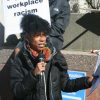KJIPUKTUK (Halifax) – A compelling lecture last Friday by David Comissiong, a progressive politician and diplomat from Barbados, suggested that the movement calling for slavery reparations is about much more than dollars and an apology from former slave trading countries.

The way Comissiong described it, the quest for reparations is also about seeking social justice within the countries making the demand for reparations. Its second objective is to establish a global governance structure that’s altogether more fair to developing nations and ensures demands for reparations receive a fair hearing, rather than being shrugged off.
Monetary demands are important, but they are also a means to these ends.
Comissiong, an articulate and passionate speaker, is well positioned to make the case for reparations, being the Barbadian ambassador to CARICOM, an umbrella organization of 15 Caribbean countries. CARICOM member states at this time are the only countries demanding reparations at a formal diplomatic level.
CARICOM’s website is a great place to begin to find out more about what all the reparations movement entails.
Lately the old idea that the horrors of slavery warrant some form of restitution to descendants of enslaved Africans has undergone a revival.
This is the case in Africa, the Americas, the Caribbean, and also in Nova Scotia.
Comissiong’s visit, and Friday’s talk at St. Mary’s University, were sponsored by the local chapter of the Global Afrikan Congress (GAC-NS), which has been leading the charge for reparations in Nova Scotia in recent years.
Various parties at Saint Mary’s University, as well as Dalhousie University, Kings College, and the Nancy’s Chair at Mount Saint Vincent University, also sponsored the visit and talk.
This week also saw the GAC-NS sponsored book launch of a wonderful little book on reparations written by kids.
Nations formally demanding reparations a first in history
The CARICOM nations are formally demanding reparations at a diplomatic level, Comissiong said at Friday’s talk. This is the first time that governments with seats at the United Nations, rather than activists, are issuing such demands.
Not to suggest that former slave trading countries such as Britain, Spain, Holland, Denmark and Norway are eager to listen to these demands, let alone offer a substantive response, he added.
“I have read the responses, all the heads of states wrote how regrettable and horrible slavery was, but they all said no to sitting down at the table with us,” Comissiong said.
In fact there were reparations paid by Britain when slavery was abolished in its colonies in 1833, but that money went to slaveholders. Furthermore, enslaved Africans were redesignated apprentices and were expected to continue to work for free for their former owners for as long as another 7 gruelling years, supposedly to “earn” their own freedom.
It’s only recently that Britain completed payments on the bonds used to raise money to pay these slaveholders, Comissiong said, one of those nasty little facts that weaken the argument that all this slavery stuff happened a very long time ago, and we shouldn’t dwell on the past.
Crimes against humanity
“Reparations are about ethics, morality, but at its core it is about crimes against humanity,” Commisong said. “The fundamental message is that there will be no impunity for the commission of crimes against humanity. You may think you got away with it, but the day of reckoning is coming.”
And it’s a moral issue not just for the nations who committed the crimes, but for those who demand reparations as well, Comissiong argued.
“If we do not make these demands, what message would that send to the world? Don’t we think our ancestors deserve this?” Comissiong asked.
Reparations is not simply about money. It’s about creating a just society
The call for reparations is not simply a demand for money, it is a way to liberate ourselves. Abolishing slavery was not the end of our oppression, which still exists up to this day, some of it in our own culture and in our psyche, Comissiong said. “Reparations is very much about the here and now, it is a creative instrument that we must deploy for our liberation.”
This also means that it must become a mass movement, not just fought at the diplomatic level by governments and a few activists, Comissiong said. In order to do so, we must give our people information and knowledge.
“Reparations must produce a just society. We are not pursuing aid, we are talking about changing inequitable structures,” said Comissiong, ”which means nobody can be left behind. We all came here in the bottom of a slave ship. That means that there is an overarching principle at work that we will not leave anybody behind.”
AfricentricTV, the official YouTube Channel of the Africentric Learning Institute, recorded the lecture on video. Click here to watch.
Book review: North to Bondage. Loyalist slavery in the Maritimes
News brief: Inquiry into Dalhousie’s connection to race and slavery presents preliminary findings
Census 2016: African Nova Scotian poverty rates through the roof, unemployment numbers terrible
With a special thanks to our generous donors who make publication of the Nova Scotia Advocate possible.
Subscribe to the Nova Scotia Advocate weekly digest and never miss an article again. It’s free!




In 1835, two years after Slavery was abolished in the UK and other places, the British government borrowed $20 million pounds (that’s hundreds of millions in today’s money) to compensate slave owners who no longer had slaves on plantations and cotton fields etc mainly in the colonies. British taxpayers have been paying off that debt for 170 years — it was just paid off in 2015. Read more about this in the Guardian Long Read here: https://www.theguardian.com/news/2018/mar/29/slavery-abolition-compensation-when-will-britain-face-up-to-its-crimes-against-humanity
Not a penny went to reparations.
Historians have estimated that there were c. 4,200 slaves in Canada, when slavery was abolished by the British Govt. Of those, 2/3 were indigenous, 1/3 were of African / Caribbean origin.
Every Black person in the Americas at that time was either enslaved, formerly enslaved,or a descendant of the 10 to 12 million Africans captured and brought here under the most horrible conditions.